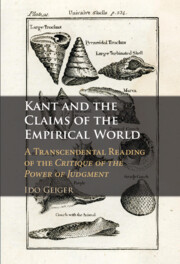 Kant and the Claims of the Empirical World
Kant and the Claims of the Empirical World Published online by Cambridge University Press: 30 April 2022
Chapter 2 argues that although the Analytic of the Teleological Power of Judgment offers an argument for the necessity of teleological judgments of organisms, Kant is ultimately interested in the conceptual purposiveness of nature as a whole. He constructs an argument from the organism to this conclusion, because it allows him to assimilate characteristic features of a dialectic, specifically the fact that it ensnares ordinary understanding. This serves the end of showing that although the principle of the purposiveness of nature is a transcendental principle of reason, employing it is free of the sort of contradictions that typically beset reason. It has a legitimate and indeed necessary role to play in experience. The chapter further argues that the discussion of the methodology of biology is of great philosophical interest. For Kant all causal explanations are mechanistic and he develops a unique model for mechanistic explanations of the processes through which organisms produce or organize themselves. Teleological judgments of organic nature are not therefore a threat to the project of the comprehensive mechanistic explanation of the natural world. The chapter demonstrates this by examining Kant’s views of contemporary theories of generation, Blumenbach, his papers on human races and his evolutionary speculation.
To save this book to your Kindle, first ensure [email protected] is added to your Approved Personal Document E-mail List under your Personal Document Settings on the Manage Your Content and Devices page of your Amazon account. Then enter the ‘name’ part of your Kindle email address below. Find out more about saving to your Kindle.
Note you can select to save to either the @free.kindle.com or @kindle.com variations. ‘@free.kindle.com’ emails are free but can only be saved to your device when it is connected to wi-fi. ‘@kindle.com’ emails can be delivered even when you are not connected to wi-fi, but note that service fees apply.
Find out more about the Kindle Personal Document Service.
To save content items to your account, please confirm that you agree to abide by our usage policies. If this is the first time you use this feature, you will be asked to authorise Cambridge Core to connect with your account. Find out more about saving content to Dropbox.
To save content items to your account, please confirm that you agree to abide by our usage policies. If this is the first time you use this feature, you will be asked to authorise Cambridge Core to connect with your account. Find out more about saving content to Google Drive.